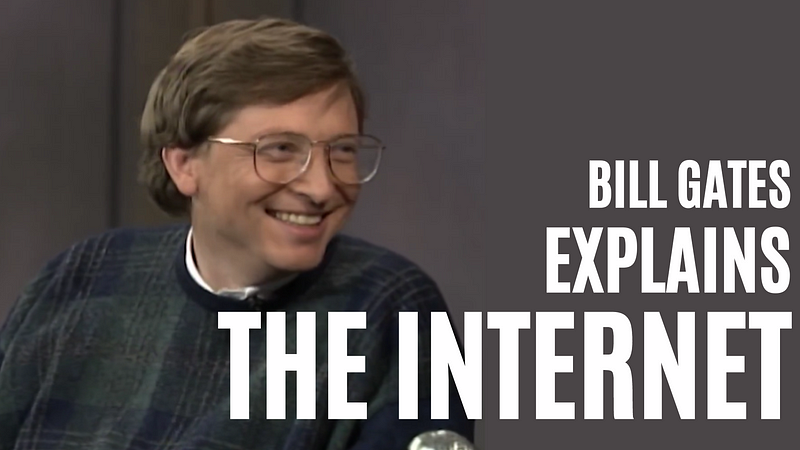How the Internet Revolutionized Our Lives: A 1995 Perspective
Written on
Chapter 1: A Glimpse into the Pre-Internet Era
Can you recall a time before the internet? For many who engage with platforms like YouTube or TikTok today, the internet has always been a part of life. However, those of us from earlier generations remember the shift vividly. The internet began its journey in 1993 when CERN made the WWW Protocol publicly available.
Recently, I came across a fascinating video featuring Bill Gates discussing the internet's advantages with David Letterman. Anyone interested in tech marketing should definitely check it out.

The 1995 Conversation: Bill Gates on the Internet
In 1995, Bill Gates made an appearance on The David Letterman Show. At that time, Letterman was akin to what Gary Vaynerchuk represents today—a major cultural figure, but on television rather than social media. During this episode, Gates attempted to explain the internet's significance.
Lessons from Steve Jobs: Focus on the Customer
You might wonder what Steve Jobs has to do with Gates' discussion. Jobs famously advocated for starting with customer benefits rather than diving directly into technical innovations. He emphasized the importance of understanding what value can be offered to customers, essentially urging companies to prioritize customer experience.
Understanding the Internet through Use Cases
Gates illustrated this principle in his conversation with Letterman. Rather than delving into the technical marvels of the internet, he highlighted practical use cases that would resonate with viewers.
Section 1.1: Use Case #1 - Broadcasting
David Letterman mentioned he had read about the possibility of listening to live baseball games online. Gates confirmed this, but Letterman countered that radio already does that. Gates pointed out, however, that the internet allows for on-demand access to content.
The reality in 2022 is that almost all broadcasting happens online—think of platforms like YouTube or TikTok.
Section 1.2: Use Case #2 - News and Information
"What else am I missing?" Letterman asked. Gates explained that the internet serves as a vast repository of information, where anyone can publish content. Letterman, feeling knowledgeable, mentioned he subscribes to two magazines, but Gates deftly redirected the discussion to the internet's broader implications.
Fast forward to 2022, and many traditional news outlets that ignored the internet have gone out of business.
Use Case #3: Social Connections
"You can connect with like-minded individuals online," Gates noted, playfully addressing the notion that the internet was primarily for socially awkward individuals. Letterman jokingly inquired about "troubled loner chat rooms," reflecting a common stereotype of the time.
Today, social media is ubiquitous, utilized by nearly everyone.
Reflections for Young Entrepreneurs
Bill Gates exemplified effective salesmanship during this exchange. Instead of challenging Letterman, he engaged with his experiences and preferences. This approach is crucial for anyone in a customer-facing role. Remember, every employee is an ambassador for their brand, and understanding marketing is vital for everyone.
Did you find this discussion engaging? If so, feel free to clap a few times and leave a comment. Explore my other profiles, sign up for my tech newsletter, and subscribe to my Medium profile for regular updates.
This article is for informational purposes only and should not be seen as financial, investment, or legal advice. Always consult professionals before making major decisions. Some links may be affiliate links.
Subscribe to DDIntel Here.
Chapter 2: The Lasting Impact of the Internet
The first video title is How The Internet Changed The World. This video delves into the transformative effects of the internet on society and communication.
The second video title is BEFORE AND AFTER THE INTERNET - How has the internet changed our lives. This video explores the profound changes in daily life and business brought about by the internet.